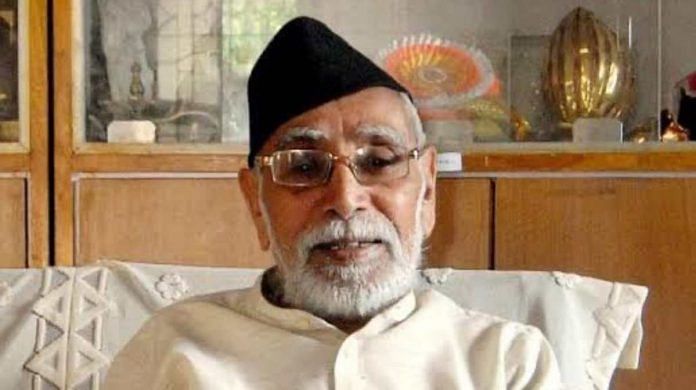New Delhi: RSS ideologue M.G. Vaidya, who passed away in Nagpur Saturday afternoon at the age of 97, was arguably the senior most swayamsevak (volunteer) of the organisation.
Known as an intellectual stalwart, Vaidya was also a Sanskrit scholar. He edited the newspaper ‘Tarun Bharat’ for several years and wrote dozens of books on the sangh and related issues. Most of these books have been translated into many Indian languages and are considered to be the primer on the sangh’s thought process on a wide variety of issues.
He had the rare distinction of working closely with all six sarsanghchalaks as he had become an RSS swayamsevak in the 1930s when RSS founder Dr K.B. Hedgewar was alive.
Hedgewar passed away in 1940. After him, the mantle of sarsanghchalak was handed over to M.S. Golwalkar, who was popularly known as ‘Guruji’. Vaidya worked very closely with him.
From 1946 to 1966 while working for the organisation, Vaidya taught at various schools and colleges. His longest stint was at Hislop College, Nagpur, from 1949 to 1966.
From 1966 to 1983, he led the Nagpur-based newspaper ‘Tarun Bharat’ editorially. During his tenure as the editor of ‘Tarun Bharat’, the newspaper was keenly watched and read by intellectuals. Incidentally, Balasaheb Deoras, who as an RSS pracharak, played an instrumental role in acquiring and rejuvenating ‘Tarun Bharat,’ which was a fledgling newspaper in the 1950s.
Balasaheb became the third RSS sarsanghchalak in 1973 after Golwalkar’s demise and Vaidya actively worked with him to sharpen the intellectual discourse within the sangh.
Also read: KR Malkani — RSS ideologue, journalist and politician who predicted Emergency
His responsibilities in RSS
In RSS, Vaidya was given important responsibilities like ‘Akhil Bharatiya Baudhik Pramukh’ (all India head for intellectual activities), ‘Akhil Bharatiya Prachar Pramukh’ (all India head for media and publicity) and national spokesperson of the RSS.
Till 2008, he was an invitee to one of the highest decision making bodies of the RSS — Akhil Bharatiya Karyakari Mandal.
Vaidya played an instrumental role during the tenure of fifth RSS sarsanghchalak K.S. Sudarshan in setting up meetings between him and Christian religious leaders.
Vaidya’s importance can be gauged from the fact that he was chosen by the organisation to write an introduction to the maiden collection of speeches of current RSS sarsanghchalak Mohan Bhagwat. Vaidya wrote a detailed introduction for this volume at the age of 97. Ironically, he passed away an hour before this volume was formally released in Delhi.
Early life and education
Vaidya was born on 11 March 1923 at Taroda village in Wardha district of Maharashtra. His father’s name was Govind Tukaram Vaidya. He had his primary education in the village itself and then went to Dadasaheb Dhanwate Nagar Vidyalaya for his secondary education.
For further studies, he joined Morris College (at present known as Vasantrao Naik Government Institute of Arts and Social Sciences) in Nagpur. He cleared his matric in 1939 in first class and intermediate in 1941, again in first class.
In 1944, he passed his BA exam not only in first class, but was also awarded the gold medal for his performance in Sanskrit. In 1946, he was awarded the Daji Hari Wadegaonkar gold medal when he cleared his MA exam.
From 1978 to 1984, Vaidya was a member of the legislative council in Maharashtra. From 1977 to 1999, he was the president of Bharatiya Shikshan Mandal, an RSS-backed organisation that works in the field of education.
One of the most popular books written by him is his autobiographical account of being in RSS — titled ‘Main Sangh Mein, Mujh mein Sangh (I am in Sangh, Sangh is in me)’.
The writer is research director with Delhi-based think tank Vichar Vinimay Kendra. He has authored two books on RSS.
Also read: Indian liberals have no strategy to counter RSS’ own brand of ‘Hindutva constitutionalism’



